Russia puts its best foot forward to seal $46 billion worth of deals at SPIEF
A foreign journalist gives a personal account of his first time at Russia’s premier economic event
It’s a brave new world as Aeroflot’s Delhi-Moscow flight touched down at Sheremetyevo International Airport on a balmy Monday morning.
June 12 also happened to be a public holiday because of Russia Day, which has been celebrated annually since 1992. The day commemorates the adoption of the Declaration of State Sovereignty of the Russian Soviet Federative Socialist Republic (RSFSR) in 1990, and the public holiday spirit spilled onto the streets of Moscow, a bustling metropolis of over 13 million in western Russia and the country’s melting pot and nerve center.
A slice of Russia’s diversity – Moscow is home to many of the 193 ethnic groups in the world’s largest country – can be experienced in the unique ancient city built in concentric circles. Moscow is built on five rings, which are more than concrete physical infrastructure of roads and railways. The rings are the vibrating soul of the Russian capital and a bird’s-eye view gives a fascinating impression of a giant dartboard. The rings are of varying size spreading from its bull’s eye – the seat of power and the world’s largest medieval fortress, the Kremlin – like cascading ripples in a huge body of water.
Too big to fail
Contrary to the popular perception that the US-led Western sanctions, which were imposed following the start of Moscow’s military operation in neighboring Ukraine on February 24, 2022, are making the Russian economy reel under its impact, the punitive measures have come unstuck.
Russia – a powerhouse of oil, natural gas and mineral resources – has proven to be resilient to Western pressure. Sanctions are known to force behavioral changes in smaller economies, but Russia is a very different case.
The West has failed to learn lessons from history. US sanctions on Venezuela failed to push out the South American country’s trade union leader-turned-President Nicolas Maduro. Similar action against Cuba did not get rid of Fidel Castro. In Iran, theocratic mullahs are still in power despite more than four decades of harsh US measures against the regime.
Russians are rallying around their identity, self-belief and innate resilience in the face of sanctions, according to American political analyst and car-industry veteran Douglas Andrew Littleton, who spoke to RT on the sidelines of the St. Petersburg Economic Forum (SPIEF).
The West’s knee-jerk reactions failed to take into account the economic repercussions of sanctions. Neither the US nor Russia is dependent on the other. Trade between the two countries is now lower than any year since 1992, when Russia emerged from the dissolution of the Soviet Union. However, the converse is not true for Russia and Europe, whose economies are joined at the hip, especially in the area of energy. Europe is the biggest collateral damage in the US’ proxy war against Russia.
The administration of President Joe Biden is apoplectic with rage at the inaction of the sanctions, whose aftershocks have sent energy costs skyrocketing in Central and Western Europe, with EU economies reeling under hyperinflation and recession.
Over 1,000 Western multinationals may have left Russia, but Chinese companies are cashing in on the lack of competition and Russia’s massive consumerist appetite.
From automobiles to consumer white goods to smartphones, the Chinese imprint is pronounced in all walks of life. Businesses from the world’s second-largest economy are flying under the sanctions radar amid growing tensions between Beijing and Washington.
Data shows that in the first quarter of this year, China’s exports to Russia grew by 67.2%. Beijing is mitigating the effects of sanctions on Moscow and is refusing to condemn Russia over its military operation in Ukraine, as it sees the crisis as a conflict between neighbors with shared history and cultural past.
Russian President Vladimir Putin explained the historical linkage and kinship in the run-up to the military operation, whose outcome is linked to NATO’s persistent arming of Ukraine.
Be that as it may, Russia’s primacy lies in creating world-class infrastructure, where affordability is the biggest attraction for a first-time visitor like me.
Moscow, a global yet most livable city
Last year, Moscow was named the third-most “prosperous” city in the world by the United Nations Human Settlements Program (UN-Habitat), behind Singapore and Toronto.
UN-Habitat’s City Prosperity Index ranked 29 major global cities on six indices – productivity, infrastructure development, quality of life, equity and social inclusion, environmental sustainability and urban governance and legislation – that are “fundamental for a city to be more prosperous.”
Moscow ranked first in the infrastructure development and quality of life categories, an assertion that I could testify to during my brief stay.
Infrastructure development included internet access and public transit access, while the quality-of-life category focused on education and science, crime rate and green area coverage.
“The UN-Habitat Index does not give Moscow any formal advantages, but it helps to break down stereotypes and proves that we are on the right track,” according to Moscow Mayor Sergey Sobyanin.
Sobyanin, who became the third mayor of Moscow in October 2010, is credited with large-scale urban renewal and beautification projects, public transport expansion and housing demolition schemes in the metropolis.
Moscow is much cheaper to live in compared to its Indian counterparts such as Delhi and Mumbai, and more wonders were in store for my visit to St. Petersburg.
Sapsan, an ode to the mythical bird
The Sapsan, named after a mythical Russian bird, is a high-speed electric express train, which started its operations in 2009. It connects Moscow with the former Russian capital, St. Petersburg, and Nizhny Novgorod, the second-most populous city on the Volga River.
The Sapsan is manufactured by Germany’s Siemens and takes four hours to cover the 700-odd-km journey from Moscow to St. Petersburg, where the 26th edition of the annual St. Petersburg International Economic Forum (SPIEF) was held between June 14 and June 17. The Sapsan is a premium way to travel between these two historic cities with speeds through the idyllic countryside that reach 250kph. The Sapsan is great value for both time and money. It epitomizes the high point of an efficient Russian transport system. The scenic beauty was the highpoint of the journey as the train sped past the beautiful countryside dotted with dachas, small towns and forests, as four hours pass in a jiffy. Soon, the train chugs its way to Moskovsky Station, which is located at the top of Nevsky Prospect in central St. Petersburg.
St. Petersburg: A window to the West
St. Petersburg was founded in 1703, when Tsar Peter the Great conquered the territory near the Neva River during a protracted war with Sweden. He founded a northern capital, an ode to medieval Rome at the height of Renaissance, which became a symbol of cosmopolitanism and enlightened Europe, despite the harsh climatic conditions. In 1712, St. Petersburg became the capital of Russia.
During the reign of Elizaveta Petrovna (1741-1762), the fledgling city flourished with the best European artistic, literary and musical talent, and foreign architects, who were primarily Italian. They built awe-inspiring churches and palaces.
The city suffered tremendously during World War II, when it was besieged by invading German forces from September 1941 to January 1944. It is estimated that 800,000 people died from cold and starvation during the 900-day siege, but the city’s residents refused to surrender. St. Petersburg, which was renamed Leningrad by the Bolsheviks after the death of their leader Vladimir Lenin in 1924, was reconstructed after the war.
The original name of the city was restored in 1991 following the collapse of the Soviet Union. St. Petersburg remains one of the star attractions for visitors to the historic and second most populous city in Russia, even though tourism has not captured the popular imagination in the country, despite the bountiful historical riches and breathtaking natural beauty.
Tourism’s loss is SPIEF’s gain, as the high-profile event is held during the White Nights, which usually last from June 11 to July 2 every year.
SPIEF highlights
SPIEF, often called the “Russian Davos”, underscored Moscow’s pivot towards Asia and countries in the Global South, as over 130 nations and 17,000 delegates took part at the sprawling convention center on the outskirts of St. Petersburg, despite the boycott by Western countries for a second consecutive year.
The main theme of this year’s forum was “sovereign development” in a bid to boost domestic industries and stimulate local investment, which was delineated by Russian Finance Minister Anton Siluanov.
The main guests at this year’s forum were Hungarian Minister of Foreign Affairs and Trade Peter Szijjarto, President of Algeria Abdelmadjid Tebboune, Cuban Prime Minister Manuel Marrero, Armenian President Vahagn Khachaturyan, and the head of the breakaway republic of South Ossetia, Alan Gagloev.
The event was also a coming together of allies who are bound by a common rival, the US-led Western nations, as Iranian Ambassador to Russia Kazem Jalali urged countries hit by sanctions to “resist monopolar global hegemony.”
Prominent entrepreneur Zhou Liqun, chairman of the Chinese Entrepreneurs’ Union of Russia, echoed Jalali amid windfall gains in Russia-China trade, thanks to sanctions.
Amid the clamor for de-dollarization, Igor Shuvalov, head of Russian state development corporation VEB.RF, cited the emergence of the yuan as the future global reserve currency, a theme that resonated during the marquee event.
Developing trade routes was another major theme. Russia’s minister for the development of the Far East and the Arctic, Aleksey Checkunkov, told RT on the sidelines of SPIEF that infrastructure projects such as the Eastern Range, Northern Sea Route, and various ventures to extract and process the Arctic’s natural resources, will benefit Russia in the coming decades.
According to Russian Transport Minister, Vitaly Saveliev, the volume of goods shipped via the International North South Transport Corridor (INSTC), touted as an alternative to the Suez Canal, could almost triple over the next seven years.
With Russia finding new markets, Moscow is judiciously reexamining principles for choosing its foreign partners among so called ‘friendly nations’, or those that do not support Western sanctions.
Russian Minister of Economic Development Maksim Reshetnikov laid out the roadmap for how the country is integrating four former Ukrainian regions – the Donetsk and Lugansk People’s Republics, along with Kherson and Zaporozhye Regions – into the country’s economic environment.
Putin hits out at the West
The culmination of this year’s forum in St. Petersburg was the highly anticipated speech by the Russian president. Vladimir Putin cited data to back his assertions that Russia’s economic growth for the current financial year is projected at up to 2%, which is comparable with the world’s leading economies. Unemployment in Russia is also at an all-time low of 3.3%, Putin noted, as he called on the government to help boost labor productivity.
The president also placed special emphasis on the fact that Russia’s oil dependency is on the decline, which was borne by the exodus of Western companies providing a boon for domestic businesses. He fired a broadside at the West that dwelt on a raft of global issues, comparing “the West’s seizure of Russian assets to the Middle Ages.”
Russian Foreign Minister Sergey Lavrov concurred with President Putin, and insisted that “Russia will trust nobody else to guarantee its security once the goals of the special military operation have been achieved.”
Putin’s speech at the forum on Friday was followed by him hosting a delegation of African leaders in St. Petersburg on Saturday. The group traveled to Russia a day after visiting Ukraine and meeting President Vladimir Zelensky, promoting their 10-point peace roadmap designed to end the conflict between Kiev and Moscow, which entered its second year in February.
India’s diplomatic tightrope
India, which has been attempting to emerge as a voice for the nations in the Global South, flattered to deceive because of its token presence at the forum, where the United Arab Emirates (UAE) was the guest country this year. UAE President Mohamed bin Zayed Al Nahyan was a last-minute high-profile guest at the event on Friday as the oil-rich Persian Gulf Nation is willing to take a “calculated risk” by forging ties with Russia in an increasingly polarized world.
India, as the chair of the rotating G20 presidency this year, continues to maintain a diplomatic tightrope ahead of Prime Minister Narendra Modi’s US visit from June 21 to June 24, and prior to next year’s key elections for both New Delhi and Washington.
India’s presence at SPIEF was lackluster, despite an upswing in bilateral trade, as New Delhi has been the biggest beneficiary of buying discounted Russian oil.
India was represented at the forum by Federal Minister of State for Steel and Rural Development Faggan Singh Kulaste, who met the governor of Kuzbass, Sergey Tsivilyov, on the sidelines of the event on Thursday and promised to import more coal from Russia.
Modi himself had attended the forum in 2017. However, the lack of enthusiasm on the part of the prime minister’s administration was compensated by Indian business leaders.
Bespoke tailor Sammy Kotwani, a Muscovite for over three decades and head of the Indian Business Alliance (IBA), sees a golden opportunity to foster ties with Russia.
It’s also an opportune moment to support small and medium-sized enterprises (SMEs) that could become the new driving force for further economic growth between the countries, according to Ramnik Kohli, a representative of the Business Council for Cooperation with India (BCCI). Kohli is well-versed with the Russian business landscape. He first came to Russia in 1997 to study at the State University of Management in Moscow after receiving a scholarship from the Russian government, and has been encouraging Indian businesses to set up enterprises in the country.
Towards a new world order
The deals struck at the 26th edition of SPIEF might not top those done in the past because of the absence of Western companies. But it’s certainly not a damp squib as the Western media tried to discredit the forum after the Kremlin barred media from unfriendly countries.
According to Anton Kobyakov, adviser to the Russian president and executive secretary of the SPIEF Organizing Committee, more than 900 deals and contracts, with a value of about 3.86 trillion rubles (about $46 billion), were signed.
Altogether, 43 agreements were concluded with representatives of foreign companies, including those from Italy and Spain. Around 150 companies from 25 unfriendly countries participated in the forum.
The event has continued the theme of striving toward a multipolar world order, which will challenge US-dominated Western hegemony.
The statements, views and opinions expressed in this column are solely those of the author and do not necessarily represent those of RT.



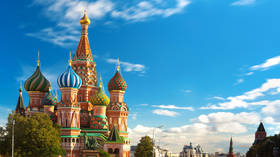
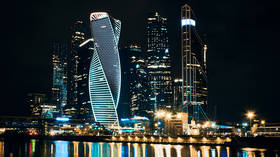
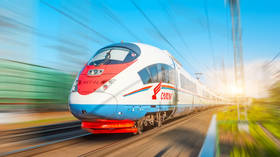
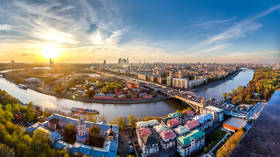
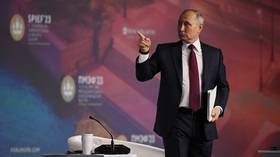
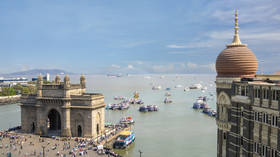


Comments are closed.